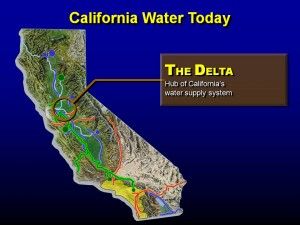CA Delta water war being won by legitimacy, not money
By Wayne Lusvardi
The most memorable proverb about California water is: “Water runs uphill towards money.”
But water doesn’t flow uphill towards money only. If it did, Southern California — which has two-thirds of the state population — would have unilaterally won the water war for the Sacramento Delta long ago.
In California, water flows from the wet North to the dry South only when there is sufficient political legitimacy. There isn’t so much a scarcity of water as there is justification for conveying it from where it naturally flows and ponds to where it doesn’t. It doesn’t matter to much of the public that California’s imported water system is socialized. Constituents see local water supplies from the Sierra Nevada as their property.
As long as Southern California is perceived as wasting Northern California water on swimming pools in Beverly Hills and Newport Beach, it will have difficulty gaining political legitimacy to prevail in the North-South political water war. And as long as pressure hoses have to be used to clean sticky berries on sidewalks from city-planted ficus trees in Pasadena to give artificial union jobs to city tree trimmers, Southern California must overcome the challenge of presenting its own narrow interests as legitimate.
Oddly, California voters passed Proposition 1A in 2008 for “high-speed rail” when what they really needed was a “high-speed water canal.” Jobs were apparently perceived as legitimate, even though high-speed rail makes no sense and doesn’t really pass any cost-benefit test. But water for farmers and Southern California cities was considered unjustified in 1982 when both Northern and Southern California both rejected the proposed Peripheral Canal around the Delta to bring water south to farms and cities.
But more recently, the State of Arizona has decided to use or water bank its full allotment of Colorado River water rather than allowing its excess to flow to Southern California. This has shifted Southern California’s dependence on water imported from the Delta from about one-third to two-thirds. But this hasn’t apparently changed the public’s perception of legitimacy for taking water from the Delta mainly during wet years when there is a surplus.
The legitimacy tide is changing
The recent vigorous opposition by Northern California to the proposed twin tunnels through the Delta indicates that California is on a fast rack to ram the Twin Tunnels over the public before there is even a vote on the California Water Bond on the 2014 ballot to gain the consent of the governed.
But all this may be changing because of the efforts of five cities in Southern California to eliminate or vastly reduce their reliance on imported water. A new report by the National Resources Defense Council, “Tackling Water Scarcity: Five California Water Agencies Lead the Way to a More Sustainable Tomorrow,” was released on April 25.
The NRDC report states:
“Cumulatively the City of Santa Monica, City of Camarillo, Ventura County Water District No. 1, Long Beach Water Department, and the Los Angeles Department of Water and Power plan to reduce their demand for imported-Bay Delta and Colorado River water by more than 40 billion gallons per year, equivalent to the amount of water 1.1 million people would use in one year.”
The City of Santa Monica is planning to be totally water self-sufficient; Camarillo 85 percent self-sufficient; Ventura County Water District No.1 will be 62 percent self-reliant; Long Beach Water Department 46 percent; and the huge Los Angeles Department of Water and Power 35 percent self-sufficient. They plan to accomplish this fete by a combination of improved water efficiencies, use of recycled water, responsible groundwater management, and rainwater and stormwater harvesting.
Reliance on Imported Water and Total Percentage Reduction
| Water Agency | Percent Imported Water, 2009-10 | Percent Imported Water, 2035 | Percent Reduction |
| City of Santa Monica | 84% | 0% | 100% |
| City of Camarillo | 64% | 7% | 85% |
| Ventura County Water District #1 | 78% | 20% | 62% |
| Long Beach Water Department | 35% | 17% | 46% |
| Los Angeles Dept. of Water & Power | 40% | 21% | 35% |
| Source: National Resources Defense Council, Tackling Water Scarcity: Five California Water Agencies Lead the Way to a More Sustainable Tomorrow, April 2013. | |||
The plans of the above-listed five water agencies aren’t the only efforts being made in Southern California.
Harvesting desert evaporation losses
The NRDC report doesn’t even mention that a small private company called Cadiz, Inc., located in the Mojave Desert, is in the process of creating water literally out of thin air by harvesting water off natural salt flats before it evaporates.
This water will be transported through re-use of abandoned natural gas lines and existing water pipelines to the Santa Margarita Water District in Orange County, Suburban Water Systems in Irvine, Golden State Water Company based in East San Gabriel Valley, the Jurupa Community Services District in Riverside County, and the California Water Service Company in San Jose.
An emerging prospect for water “legitimacy coalitions”
There is the emerging prospect of water “legitimacy coalitions” forming between Northern and Southern California due to efforts to gain full or larger water self-sufficiency of the five water systems cited above. Perhaps Northern Californians would realize that it would be mostly excess water that would be shipped southward during wet years from the Delta.
Ironically, it is environmental activist groups that are often opposing such efforts at water sustainability. But as Southern California cities gain more political legitimacy for water sustainability efforts, the legitimacy of oppositional environmental organizations will decline. Even successful and amply funded social activists need to seek external sources of legitimacy.
Conveyance
“An unjust king is like a river without water” — Arabian proverb
California may not have a water scarcity problem as much as it has a water conveyance legitimacy problem.
California’s water war is being slowly won as Southern California cities and private water resource development companies gain public legitimacy, even as support for environmental activist organizations declines.
Related Articles
Landmark water bond now faces voters
As August draws to a close, the state has seen a striking instance of successful high-level bipartisan wrangling. Sacramento secured
Committee Endorses Prop. 22
Steven Greenhut: The GOP’s initiative committee this morning embraced Prop. 22, 9-8, the obnoxious anti-property-rights initiative promoted by the left-wing
New bullet-train biz plan still doesn’t address judge’s objection
On Friday, the California High-Speed Rail Authority released a new business plan for the bullet train project. The authority’s document





